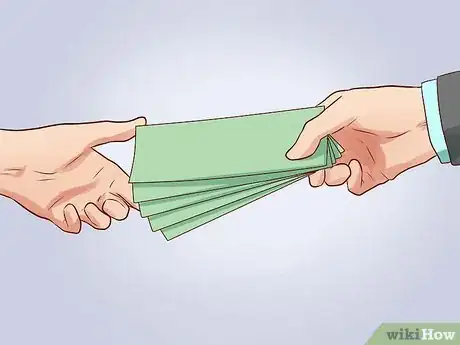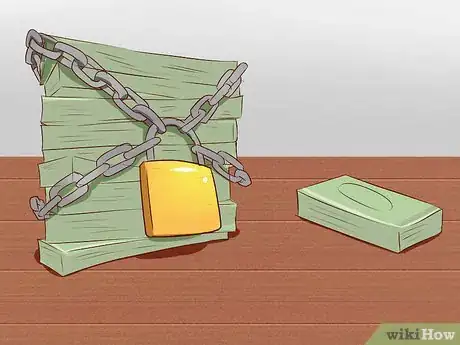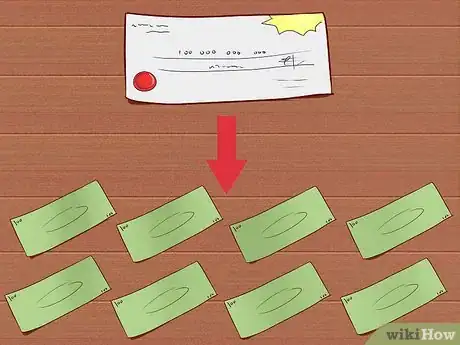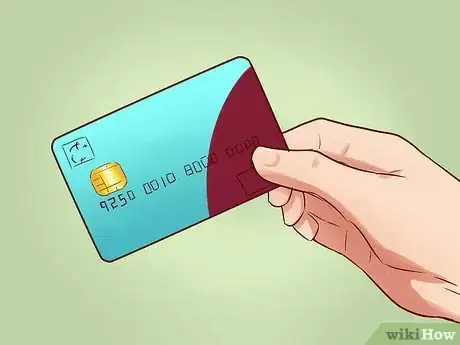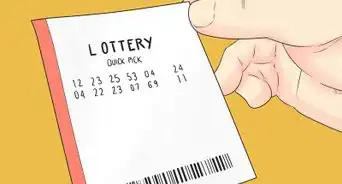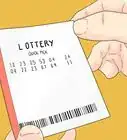This article was co-authored by Derick Vogel. Derick Vogel is a Credit Expert and CEO of Credit Absolute, a credit counseling and educational company based in Scottsdale, Arizona. Derick has over 10 years of financial experience and specializes in consulting mortgages, loans, specializes in business credit, debt collections, financial budgeting, and student loan debt relief. He is a member of the National Association of Credit Services Organizations (NASCO) and is an Arizona Association of Mortgage Professional. He holds credit certificates from Dispute Suite in credit repair best practices and in Credit Repair Organizations Act (CROA) competency.
There are 8 references cited in this article, which can be found at the bottom of the page.
wikiHow marks an article as reader-approved once it receives enough positive feedback. This article has 22 testimonials from our readers, earning it our reader-approved status.
This article has been viewed 1,587,563 times.
You just won the lottery! All those bad tickets and unlucky numbers can finally be put in the past. But what happens after you win the jackpot? Read on for information on how to claim the prize and use your windfall wisely.
Steps
What to do straight after you've won
-
1Try to keep quiet. Don't tell anyone you have won until you actually have the money. However large the sum, your life is going to change pretty drastically, and it takes a while for your newly minted circumstances to sink in. So relax, take a deep breath, and don't blabber. You want to keep your privacy for as long as possible.[1]
-
2Carefully read all instructions. Do this before claiming your prize. Instructions will be on both the lottery ticket and on the ticket agency's website. You wouldn't want your earnings to disintegrate on a stupid technicality, would you?[2]
- Sign your name on the back of the ticket unless the rules forbid it or unless this would stop you forming a blind trust to accept the money on your behalf.[3]
- Make several photocopies of the front and back of your ticket, and deposit the original in a safety deposit box in a reputable bank.
Advertisement -
3Contact a lawyer immediately. You want to weigh your legal options regarding keeping bank accounts and dividing the winnings. Your lawyer will give you expertise and make sure you don't run into any legal pitfalls.[4]
Working out the legal and financial implications
-
1Protect your privacy and identity. The names of most lottery winners are published by the media, and you will likely have interview requests from local news outlets.[5]
- You may be able to protect your privacy in the way you choose to receive the winnings. Or, you may be able to use legal entities to help mask your identity.
- Think carefully about whether you want media attention. It's good fun to appear on the nightly news and become an instant celebrity, but that celebrity comes with a few inconveniences. Your friends may begin asking you for money. Your actions will be scrutinized. People will expect you to do certain things now that you are rich. Courting media attention may not be the best step if you want to avoid these inconveniences.
-
2Consider having your attorney form a blind trust. This will let you collect the money while maintaining your anonymity. You will be able to designate the power of attorney, and your attorney will help you iron out any other wrinkle you may encounter in the arrangement.[6]
-
3Take taxes into consideration. Two things are certain in life: Death and taxes. Well, you probably don't have to worry about death just quite yet, unless the shock of the prize has your heart feeling a little fluttery. But, yes, there will be taxes. Estimate that about half your winnings will go to pay taxes. And you may get double taxed on your win, first when you receive it but also if it moves your tax rate higher you will get a further tax demand at the end of the tax year.
- All lottery winnings are considered taxable income in the United States, regardless of whether they are received as a lump sum or in multiple annual payments.
- Holding the lottery winnings in a trust has some tax advantages because it avoids probate of the lottery proceeds upon death of the winner and minimizes taxes on the estate.
- Translation: trusts don't get taxed as much, so consider setting one up!
-
4Form a partnership if tickets were jointly purchased. If you purchased the ticket as part of a group, you're probably going to need to do some major discussing and planning with your group.
- Consider the circumstances of tickets purchased jointly or by a group of individuals. Was there a verbal agreement to share the winnings? Can it be enforced under state law? Forming a legal partnership may be a better way to receive the winnings on behalf of all the partners rather than having one person receiving the checks.
-
5Look at circumstances involving spouses or significant others. Lottery money may be considered a marital property acquired during marriage, especially if the ticket was purchased with marital funds.
- This means it may be subject to division among both parties upon divorce. Even if the parties are not married, there may be a joint right-to-winnings.
-
6Look at gifting money to family and friends. Lottery winners can make a gift of their winnings, up to the annual exclusion limit, without incurring gift tax liability. Making gifts to charities also has advantageous tax implications for lottery winners.[7]
- A good way to help your loved ones is to pay off their debt, helping them long term instead of just gifting them in the short term.
- Think about giving to charities that you feel strongly about, or organizations that are in need. Make sure you know their work is reputable and not invented yesterday.
- Make the recipients of your gifts sign confidentiality agreements. This will keep them from revealing the disclosure of your gift for at least five years.
Creating long-term benefits from your winnings
-
1Contact a reputable accountant or financial advisor. You will want to do this before spending any money. They will help you weigh all possible options and give you the best possible counsel for managing your winnings.
- Your financial advisor will discuss with you a plan for how much money to spend versus to save, whether to invest your money and where, along with projections like when you can expect to retire.
- Consider a private bank and private banker just for your lottery and have the proceeds of your investing deposited in your regular savings account, moving the money to checking as needed.
- Set up a trust at your private bank for your children and grandchildren to draw from.
-
2Give yourself a modest initial spending spree. Lottery winners who go bankrupt often go crazy buying houses and cars in the initial stages of having their winnings. Sock away the rest of your winnings so you can live on the interest.[8]
- It's probably not the most attractive proposal, but balance out your short-term interests with your long-term goals. No one ever regretted having saved money in the long run.
-
3Consider taking annual payments over a lump sum. This will allow you to make a year or two of potentially bad financial decisions while you learn the ropes of the best ways to manage your money.[9]
-
4Consider not quitting your job. You may be wealthy; however, you will need something to keep you busy and keep you from spending all of your newfound riches. Try working part-time or taking a leave of absence.
- Now is the perfect time to explore that career you always wanted. Whether it's being an artist, franchise owner, or high school teacher, pursue the job you really want now that you have the means and some time to explore.
- Consider going back to school. If you love learning and the satisfaction that comes along with knowledge, think about enrolling in classes that interest you. You don't need to get into Harvard. A simple community college will do, as long as you're giving your brain a workout.
- Consider taking financial classes, they can help you understand the reports from your team of financial advisors.
- Do pay off your loans.[10]
-
5Invest, invest, invest. You know that saying, "You need money in order to make money." Well, that statement still applies. You have a chance to make a significant amount of money merely by investing. It's not iron-clad, but it's a good way to make sure your money isn't just wasted or sitting there "not working for you".
- Remember, if your investments are not producing more return than inflation then in real terms the "purchasing power" of your money is actually shrinking.
- Diversify your portfolio, but have a cap on risky investments. Consider safer routes, such as a retirement plan, time deposits, certificates or money markets. Ask your local credit union if they need another volunteer board member. Learn the financial ropes.
- If you're in the US, remember that the US government only insures each bank account up to $250,000, which means that you shouldn't have more than $250,000 in each bank account if you want to be safe. Invest money that isn't in a bank account in the bond or stock market.
-
6Buy everything with a rewards-based credit card and pay it off monthly from your checking account. That way, you can reap even more rewards for nothing. Just make sure to pay on time, so as to avoid any whiff of interest owed to the bank.
-
7Keep a low profile. Keep your old friends close. You already trust them and know that they're there for the long haul. Try not to be flashy or attract any unwanted attention.[11]
-
8Buy smart. You may have enough money to buy an island and found a micronation, but you still have to run that micronation. Consider the additional expenses involved before buying.
- Think before you buy a house. How much will property taxes be? How much will utilities be? How much will I spend on upkeep? Consider also that the value of a house often fluctuates with the market.
- Think twice before you buy a fleet of Porsches. Cars lose half their value as soon as you drive them home from the dealership. Expensive cars require expensive maintenance, and foreign cars have tariffs slapped on them by governments.
-
9Treat your family well. If they were there for you long before you were a lottery winner you may want to treat them to something special. But you are under no obligation to relieve any of their financial duress, if they have any. Remember that your family can help you.
-
10Purchase CDs at $250,000 each, insured federally, and take the proceeds. Buy the current highest interest bearing CD for the shortest term possible and roll or repurchase at a higher rate until you can find a better rate of return. Your bank will help you do this.[12]
Community Q&A
-
QuestionWhat is the normal fee for a accountant or legal adviser to help set up a trust?
 Community AnswerA trust, depending on how intricate it is, costs about $1500-$2000. However, be sure to talk about fees with the lawyer up front, knowing exactly what it will cost to work with them.
Community AnswerA trust, depending on how intricate it is, costs about $1500-$2000. However, be sure to talk about fees with the lawyer up front, knowing exactly what it will cost to work with them. -
QuestionIf two people win on one ticket, do both people sign the ticket?
 Community AnswerIt depends on your state of residency. In California, for example, only one person can sign the ticket. Check your state lottery web site.
Community AnswerIt depends on your state of residency. In California, for example, only one person can sign the ticket. Check your state lottery web site. -
QuestionHow many weeks after winning before the money is available in my bank?
 Community AnswerIt varies, but a jackpot win will typically take 6-8 weeks from claiming to being available to you. In the interim, you should be able to secure a line of credit.
Community AnswerIt varies, but a jackpot win will typically take 6-8 weeks from claiming to being available to you. In the interim, you should be able to secure a line of credit.
Warnings
- Try not to let money be the main topic or issue between you and your friends, extended family, and girlfriends/boyfriends.⧼thumbs_response⧽
- Many lotteries will require a release to allow them to publicize the game, but you should be able to get legal advice to prevent this on grounds of privacy. And in case you can’t, as a last resort wear dark glasses, change your dress style and use a disguise in every publicity photo.⧼thumbs_response⧽
- Remember that money doesn't buy happiness. Some of the richest people in the world have the least amount of happiness.⧼thumbs_response⧽
Expert Interview

Thanks for reading our article! If you'd like to learn more about dealing with winnings, check out our in-depth interview with Derick Vogel.
References
- ↑ https://www.forbes.com/sites/deborahljacobs/2012/02/11/10-things-to-do-when-you-win-the-powerball/#707868943775
- ↑ https://www.personalfinanceforbeginners.com/what-to-do-if-you-win-the-lottery/
- ↑ https://www.personalfinanceforbeginners.com/what-to-do-if-you-win-the-lottery/
- ↑ https://www.forbes.com/sites/zackfriedman/2018/09/26/powerball-mega-millions-win-advice/#28e8223c2e88
- ↑ https://www.forbes.com/sites/zackfriedman/2018/09/26/powerball-mega-millions-win-advice/#28e8223c2e88
- ↑ https://www.vice.com/en_us/article/ppvejb/a-lawyer-who-specializes-in-lottery
- ↑ https://www.forbes.com/sites/deborahljacobs/2012/02/11/10-things-to-do-when-you-win-the-powerball/#6b0bdbec3775
- ↑ https://www.cbsnews.com/news/got-the-winning-lottery-ticket-an-economist-explains-what-to-do-with-all-that-money/
- ↑ https://www.cnbc.com/2017/12/29/what-to-do-if-you-win-the-lottery-in-2018.html




